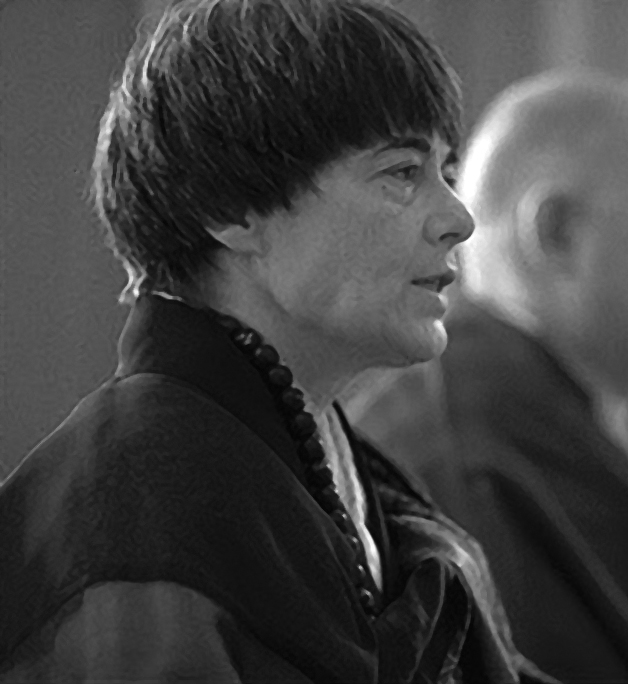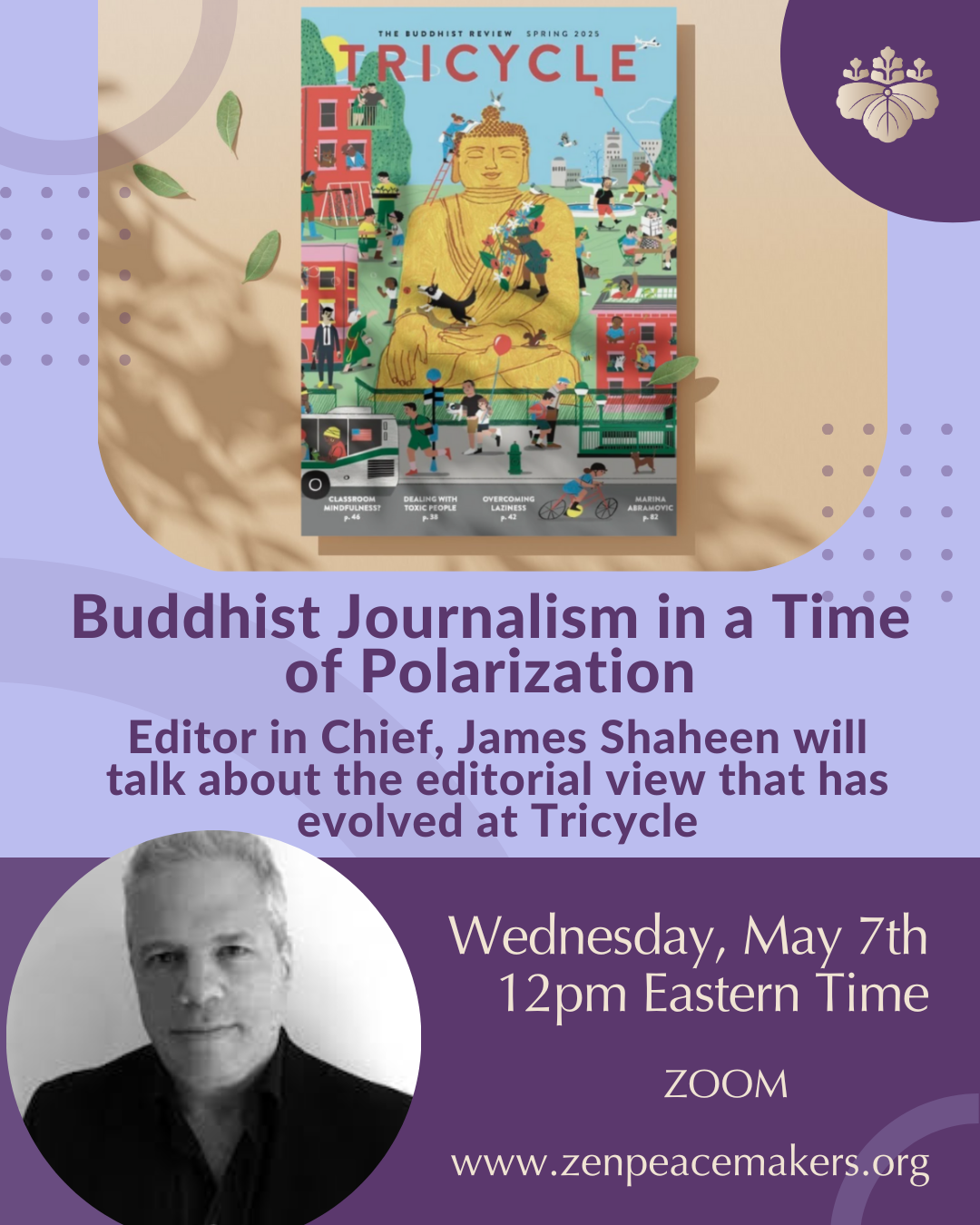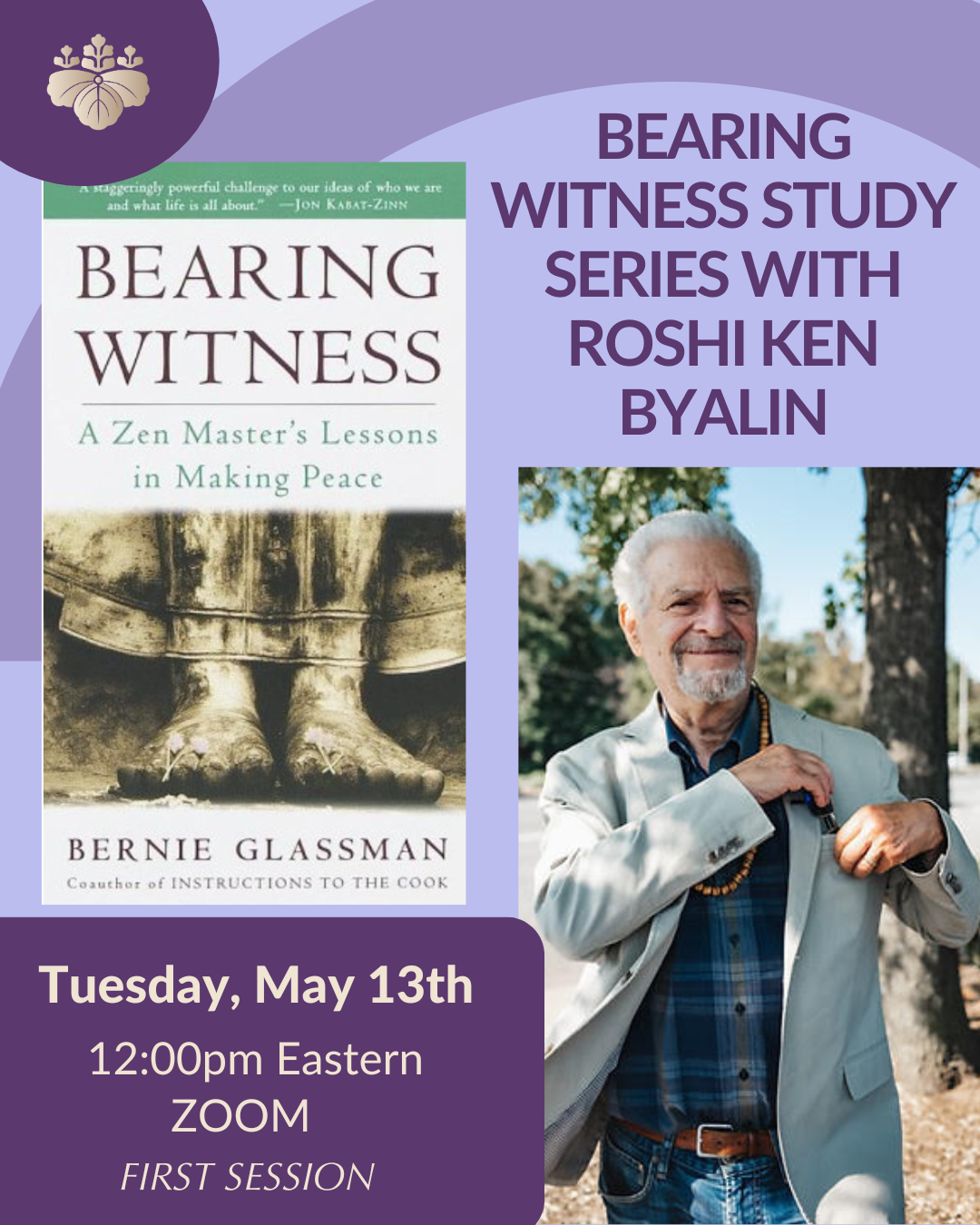Today is the 19th anniversary of the passing of Roshi Sandra Jishu Angyo Holmes, the co-founder of the Zen Peacemaker Order and Zen priest of the White Plum Asanga. Her contribution to the Zen Peacemaker vision still reverberates today as we honor her life and service.
Talk in Honor of Sandra Jishu Angyo Holmes (1941-1998)
by Roshi Eve Myonen Marko
(This talk was given by Eve in a one-day retreat on March 18, 2006)
LEVERETT, MASSACHUSETTS, USA. Today’s talk is a reminiscence about the woman whose picture is up on the altar. Monday, March 20th will be the 8th anniversary of the passing of Sandra Jishu Angyo Holmes, the Co-Founder of the Zen Peacemaker Order. Jishu was her Buddhist name. Angyo, which means peacemaker, was a name which members of the Zen Peacemaker Order received when they were installed in the Order.
She was born in California in 1941. She came out East, went to Columbia University and became a biochemist. She did early research in the AIDS disease that was only then being identified and diagnosed. And she was a seeker. At first she pursued Vedanta and followed the teachings of Ramana Maharshi. She went to visit his ashram in India and continued to practice in New York, even teaching herself Sanskrit. Finally, around 1981, she left her work and came to live at the Zen Community of New York in Riverdale. In addition to a regular schedule of meditation, study and retreats, the Community had already begun a business, a bakery, and its next steps were in the direction of social action. That is where I met her 5 years later when I, too, came to ZCNY.
![]()
I remember her as slim, very pale, pretty, dark haired, and overworked. She was highly intelligent and deeply committed to the practice. She ordained as a priest and in 1986, when we started our first social action ministry, the Greyston Family Inn, she was named its director. The mission of the Greyston Family Inn was to build apartments for homeless families, mostly single mothers with children. We lived in the city of Yonkers in Westchester County, which at that time had the highest per capita rate of homelessness in the country. We had almost no money and no professionals in the field. The Yonkers community did not welcome us right away and we were building everything from scratch. It took us 4 years just to get the first housing project, 18 apartments, purchased, renovated, and open to families.
But for Jishu other things were more difficult. In many ways she was a hermit. She said about herself that she’d always wanted to be a nun and practice in simple seclusion. When she came to live in ZCNY she was thrust into a communal setting, living in the midst of a large group of people in one house. And when she became the head of GFI there were people around her morning, noon and night: not just Zen practitioners like her, but construction workers with immigration problems, the local ethnic community that frowned on the strange white Zen people living in their midst, the creditors who called day in and day out asking for their money, the New York government bureaucracy, and most of all the single mothers with children, from backgrounds of poverty, drugs and alcohol, whom she was trying to help. By temperament and he was not sociable or gregarious, but rather shy and timid, and often worried that she was not likeable. By choice, she took it all on.
I remember coming to work one Saturday morning. We’d begun to hire local people in the organization, some of whom never had office jobs and needed training in office skills and equipment. I had trained a receptionist and asked her to make many copies of a newsletter to send out. The following morning I came in to discover that it was a mess. The pages were in the wrong order and they were upside down. I was tired, frustrated and angry. Jishu, who was then my supervisor, was the only one there. I walked over to her and said, « Look at this job. I don’t know what do anymore. How are we supposed to get anything done with so little help? » She thought a minute, then said quietly, « It helps to know why you’re here. You see all these things? » She motioned to the financial reports, construction drawings, and the many files on her desk. « I could do this with one hand tied behind my back. It’s important work, but that’s not the reason I’m here. The reason I’m here is to be with people. »
I have here quotes from her journals which were made public after she died: My basic form of spirituality is faith in the unknown. I believe that everything that comes into my life is for me to work with spiritually; Zazen is my ideal practice although I have to struggle with myself every day to do it. My spirituality is an inheritance from my father. He has been a seeker all of his life but could never find peace. He could never see that he is everything that happens to him. His whole world seems to be a struggle against the enemy, both internal and external. I find that my own struggles are an integral part of my spiritual path and that my awakening is very, very gradual.
At some point it became clear that she was on a path towards dharma transmission and becoming a Zen teacher. She had little faith in herself as a teacher; she often said that she was afraid of misleading people. I am trying to keep a phantom self alive and the further I proceed towards Shiho (dharma transmission) the more precarious the existence of that self is. Maybe it has to be killed. I have to kill the idea that there could be such a thing as realization or awakening for me. Everything just as it is leaves me with just who I am, which has never been acceptable to me.
We can talk about realization, enlightenment, and dharma transmission, but those are just ideas. What is Zen? Life as it is. And as she wrote, life as it is leaves me with me just as as I am: Jishu as she is, Eve as she is, Kiyo as he is, Basia as she is. Can we accept that? Can we accept ourselves just as we are?
I believe that in the end she learned to accept herself in the way many of us learn to accept ourselves even in the pits of our days, when we really hit bottom. It’s at those times that we look at ourselves and say: With all my faults, with all my failures, with all my doubts, I am a vessel of the dharma. And as such, I can serve. I will continue to have my doubts and misgivings, and I can serve.
And she served. She built apartment buildings and day care centers. When we got involved in AIDS work she did the initial research to get us a Certificate of Need from the government. That AIDS center is today a national model in this country for effective, compassionate work with people with AIDS. She began to teach and ultimately co-founded the Zen Peacemaker order. And she did all that with doubts and struggle. And the struggle was transparent to all. When you lead a public life you don’t have the luxury of retreating to a private space and having your struggle all to yourself. It’s right out there, the depression, the doubts, the misgivings, visible to the entire world. And she kept on going. She practiced a lot, she realized a lot, and some of the doubts remained, for that was part of who she was.
While working with a prison inmate, she wrote: Just as the Buddhist who said to the hot dog vendor, Make me one with everything, the good news is that you are one with everything. Just as you can’t fall outside of God’s loving embrace, you can’t fall outside the Kingdom of God, which truly is within you. Whether you are in a state of bliss or in the profoundest hell, you are not anathema. All your paths are superintended, you have always been on the Path. You can’t fall off it. Everything is conspiring to lead you home to experience your true nature. Everything you are doing now, including all the mess-ups and screw-ups and mistakes are exactly the right thing for you to learn what you need to know to move along your path. All the causes and conditions of your unique life have brought you to this moment. And given your particular set of causes and conditions you have always done your best.
She died 8 years ago, just a few days short of her 57th birthday. Had she lived she’d be approaching her 65th birthday now. Towards the end of her days she wrote: I want results instead of process. What a trap. As I create and listen, I will be led. As I create and listen, I will be led. As I create and listen, I will be led. The process takes care of itself. Just listen. As I create and listen, I will be led.
It’s so simple. It’s life as it is, and if it’s life as it is then it must be me as I am. I don’t have to add anything extra; I don’t have to worry too much, I don’t have to analyze or plan or think, though all these things have their place. As I create and listen, I will be led. I just have to listen. Just listen.
 Roshi Eve Myonen Marko is one of the founding teachers of the Zen Peacemaker Order and a principal teacher at Green River Zen Center in Massachusetts, USA. She has co-led bearing witness retreats in Auschwitz-Birkenau, Rwanda and the Black Hills. Eve writes regularly in her blog and is the author of the novel The Dogs of the Kiskadee Hills: Hunt for the Lynx.
Roshi Eve Myonen Marko is one of the founding teachers of the Zen Peacemaker Order and a principal teacher at Green River Zen Center in Massachusetts, USA. She has co-led bearing witness retreats in Auschwitz-Birkenau, Rwanda and the Black Hills. Eve writes regularly in her blog and is the author of the novel The Dogs of the Kiskadee Hills: Hunt for the Lynx.





5 Responses
Fairly! This was a truly amazing post. Thank you for your supplied information
Sitting in the park with my dog
Touched by this tenderness
This candle flame of love, passed on to us
Thank you
I remember now
Beautiful.
Thank you for sharing this, Eve.
Robin/Hogen
Very beautiful and touching, thank you Eve.
Bill
Such a beautiful and inspiring remembrance. I also treasure a quote attributed to her: “only the wounded healer is able to heal. As long as we think spiritual leaders need to be perfect, we live in poverty. I have a perfect teacher inside; there is no perfect teacher outside.”